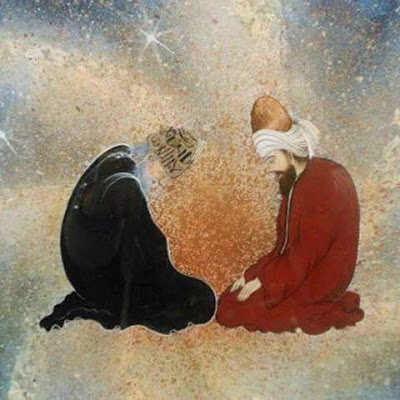Mevlana Jelaluddin Rumi
Jelaluddin Rumi (1207–1273) was a Persian poet and Sufi mystic and is widely regarded as the greatest mystical poet of any age. He was born in Afghanistan in a part of the Persian empire. It is said that no other poet in history has had so exalted and comprehensive an impact on the civilization he adorned.
Islamic scholar A.J. Arberry said “In Rumi we encounter one of the world’s greatest poets. In profundity of thought, inventiveness of image, and triumphant mastery of language, he stands out as the supreme genius of Islamic mysticism.”
Rumi’s ecstatic poetry has been a part of classical and devotional music from Turkey to Pakistan. Rumi often expresses a deep connection with the power of music: “Love plays and is the music played./ Let that musician finish this poem.” He is able to contain and continue intricate theological arguments and at the same time speak directly from the heart or to the heart. He writes with humor and inspired passion.
The brilliant translations of Coleman Barks, the premiere English translator of Rumi, deeply convey the essence of Rumi’s work from bewilderment, emptiness and silence, to flirtation, playfulness and majesty. In this poetry the secular and the sacred are always mingling. Rumi spoke his sublime poems. As Barks explains, “They were written down by scribes, and later revisions were made by Rumi on the page, but for the most part his poetry can be considered spontaneous improvisation.”
At the age of 37, Rumi’s life changed profoundly when he met a wandering dervish: Shams Tabriz, a man in rags who was in tune with the Infinite. Rumi followed this fierce dervish and they became inseparable. Their friendship was mysterious, esoteric and sacred. From his contact with Shams, Rumi became a mystical poet. As Shams was such a profound inspiration to Rumi, many times he said that Shams was the author of his poetry. “Shams” symbolizes the power of grace.
Rumi would whirl around, hour after hour. The whirling, moving meditation done by Mevlevi dervishes, originated with Rumi and is an ecstatic dance of surrender. As Rumi says, “When someone mentions the gracefulness of the nightsky, climb up on the roof and dance and say, Like this…”
Finally, as Barks writes, “The vital God-human or human-God connection can break through anywhere at any time. I like to hope that Rumi’s poems, even in translation, carry the essence of the transforming friendship of Rumi and Shams, that sun can reappear, whole and radiant in any one of us at any moment.”
Islamic scholar A.J. Arberry said “In Rumi we encounter one of the world’s greatest poets. In profundity of thought, inventiveness of image, and triumphant mastery of language, he stands out as the supreme genius of Islamic mysticism.”
Rumi’s ecstatic poetry has been a part of classical and devotional music from Turkey to Pakistan. Rumi often expresses a deep connection with the power of music: “Love plays and is the music played./ Let that musician finish this poem.” He is able to contain and continue intricate theological arguments and at the same time speak directly from the heart or to the heart. He writes with humor and inspired passion.
The brilliant translations of Coleman Barks, the premiere English translator of Rumi, deeply convey the essence of Rumi’s work from bewilderment, emptiness and silence, to flirtation, playfulness and majesty. In this poetry the secular and the sacred are always mingling. Rumi spoke his sublime poems. As Barks explains, “They were written down by scribes, and later revisions were made by Rumi on the page, but for the most part his poetry can be considered spontaneous improvisation.”
At the age of 37, Rumi’s life changed profoundly when he met a wandering dervish: Shams Tabriz, a man in rags who was in tune with the Infinite. Rumi followed this fierce dervish and they became inseparable. Their friendship was mysterious, esoteric and sacred. From his contact with Shams, Rumi became a mystical poet. As Shams was such a profound inspiration to Rumi, many times he said that Shams was the author of his poetry. “Shams” symbolizes the power of grace.
Rumi would whirl around, hour after hour. The whirling, moving meditation done by Mevlevi dervishes, originated with Rumi and is an ecstatic dance of surrender. As Rumi says, “When someone mentions the gracefulness of the nightsky, climb up on the roof and dance and say, Like this…”
Finally, as Barks writes, “The vital God-human or human-God connection can break through anywhere at any time. I like to hope that Rumi’s poems, even in translation, carry the essence of the transforming friendship of Rumi and Shams, that sun can reappear, whole and radiant in any one of us at any moment.”



Yorumlar
Yorum Gönder